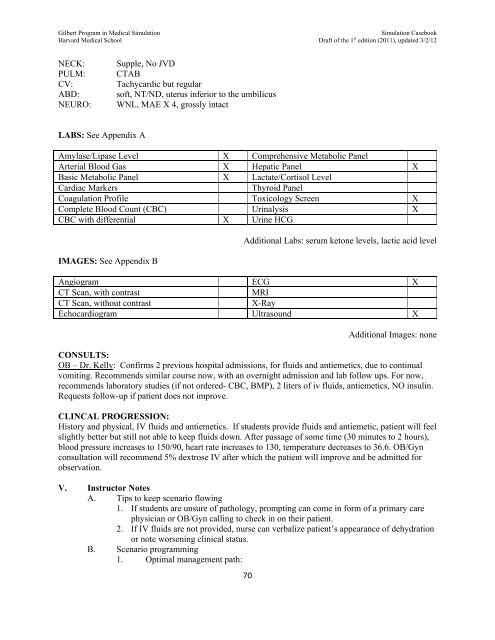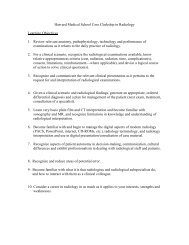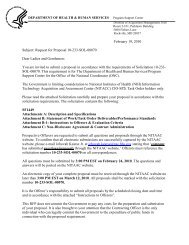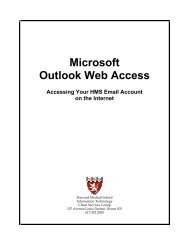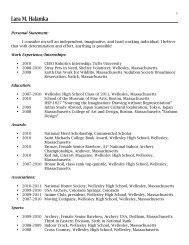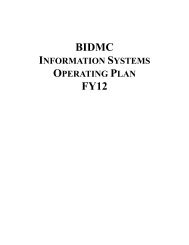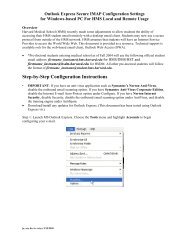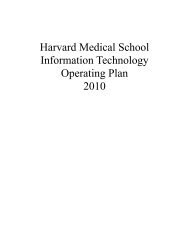SIMULATION CASEBOOK - MyCourses
SIMULATION CASEBOOK - MyCourses
SIMULATION CASEBOOK - MyCourses
Create successful ePaper yourself
Turn your PDF publications into a flip-book with our unique Google optimized e-Paper software.
Gilbert Program in Medical Simulation<br />
Simulation Casebook<br />
Harvard Medical School Draft of the 1 st edition (2011), updated 3/2/12<br />
NECK:<br />
PULM:<br />
CV:<br />
ABD:<br />
NEURO:<br />
Supple, No JVD<br />
CTAB<br />
Tachycardic but regular<br />
soft, NT/ND, uterus inferior to the umbilicus<br />
WNL, MAE X 4, grossly intact<br />
LABS: See Appendix A<br />
Amylase/Lipase Level X Comprehensive Metabolic Panel<br />
Arterial Blood Gas X Hepatic Panel X<br />
Basic Metabolic Panel X Lactate/Cortisol Level<br />
Cardiac Markers<br />
Thyroid Panel<br />
Coagulation Profile Toxicology Screen X<br />
Complete Blood Count (CBC) Urinalysis X<br />
CBC with differential X Urine HCG<br />
IMAGES: See Appendix B<br />
Additional Labs: serum ketone levels, lactic acid level<br />
Angiogram ECG X<br />
CT Scan, with contrast<br />
MRI<br />
CT Scan, without contrast<br />
X-Ray<br />
Echocardiogram Ultrasound X<br />
70<br />
Additional Images: none<br />
CONSULTS:<br />
OB – Dr. Kelly: Confirms 2 previous hospital admissions, for fluids and antiemetics, due to continual<br />
vomiting. Recommends similar course now, with an overnight admission and lab follow ups. For now,<br />
recommends laboratory studies (if not ordered- CBC, BMP), 2 liters of iv fluids, antiemetics, NO insulin.<br />
Requests follow-up if patient does not improve.<br />
CLINCAL PROGRESSION:<br />
History and physical, IV fluids and antiemetics. If students provide fluids and antiemetic, patient will feel<br />
slightly better but still not able to keep fluids down. After passage of some time (30 minutes to 2 hours),<br />
blood pressure increases to 150/90, heart rate increases to 130, temperature decreases to 36.6. OB/Gyn<br />
consultation will recommend 5% dextrose IV after which the patient will improve and be admitted for<br />
observation.<br />
V. Instructor Notes<br />
A. Tips to keep scenario flowing<br />
1. If students are unsure of pathology, prompting can come in form of a primary care<br />
physician or OB/Gyn calling to check in on their patient.<br />
2. If IV fluids are not provided, nurse can verbalize patient’s appearance of dehydration<br />
or note worsening clinical status.<br />
B. Scenario programming<br />
1. Optimal management path:


